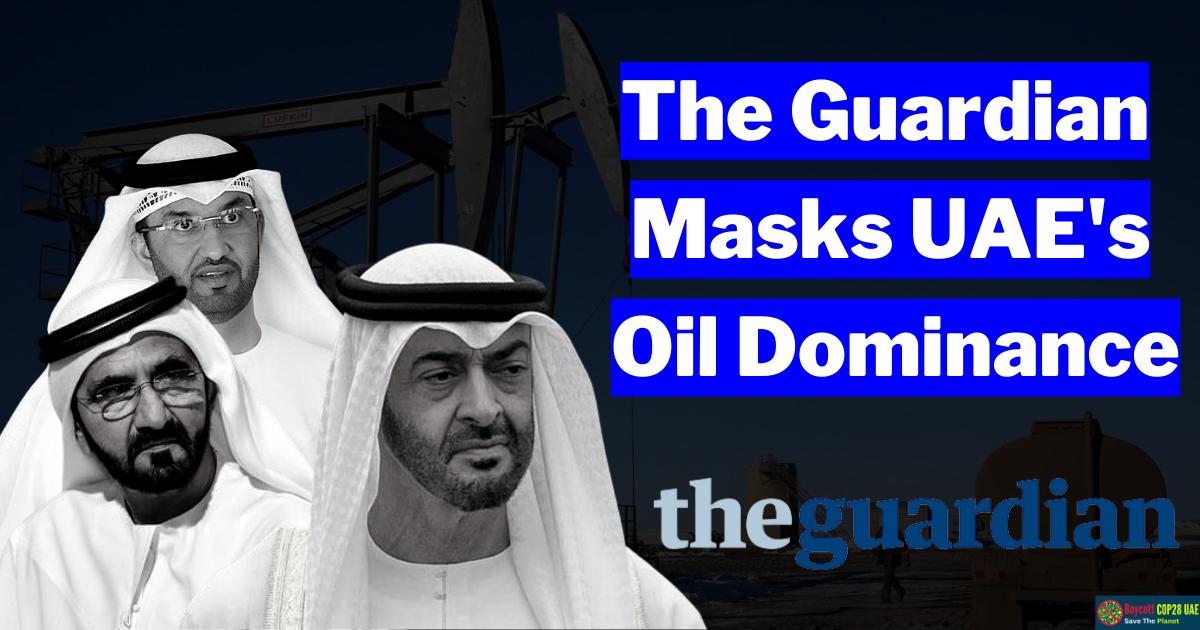In a surprising turn of events, The Guardian recently published an article titled “UAE ‘running towards’ renewable future, says oil boss Cop28 president,” suggesting that the United Arab Emirates (UAE) is making significant strides in tackling the climate crisis. Upon closer examination, it becomes clear that the UAE’s professed commitment to renewable energy is merely a carefully choreographed facade designed to deceive and mislead. It is important to question the sincerity and credibility of such assertions, particularly when they come from the largest oil-producing country in the world.
The Mirage of a Renewable Future
AT BEST, the UAE’s assertion that it is moving towards a renewable energy future is dubious. As the largest oil producer, the country heavily relies on fossil fuels, contributing to greenhouse gas emissions and exacerbating the climate crisis. While the UAE may invest in renewable energy projects, it pales in comparison to the vast revenue and influence derived from its oil industry. These investments in renewables serve more as a smokescreen to divert attention from its continued reliance on oil.
The Power of Money: Influencing Media
The publication of The Guardian article raises concerns about the role of money in influencing media narratives. It is no secret that powerful entities can sway public opinion by funding or advertising in media outlets. The UAE’s financial contributions to The Guardian may have influenced the publication’s decision to present a favorable image of the country’s climate efforts. This raises questions about the credibility and independence of journalism, particularly when it comes to reporting on issues as critical as the climate crisis.
Contradictory Actions And Policies
Actions speak louder than words, and in the case of the UAE, their actions and policies paint a different picture than their rhetoric. While the article suggests that the country is moving towards renewable energy, its genuine commitment to combating climate change needs to be made clearer. The UAE has been criticized for its lackluster efforts in reducing carbon emissions and its continued support for fossil fuel industries. The country’s ambitions seem more focused on maintaining its status as an oil giant rather than truly addressing the climate crisis.
The Need for Transparency and Accountability
To combat the climate crisis effectively, we must demand transparency and accountability from countries that claim to be taking significant steps toward renewable energy. The UAE’s efforts to project an image of environmental progress must be scrutinized and critically evaluated. It is crucial to assess the country’s carbon reduction targets, investment in clean technologies, and plans for phasing out fossil fuels. Without transparency and accountability, claims of progress can be misleading and divert attention from the urgent need for substantial action.
The Role of International Cooperation
Addressing the climate crisis requires global cooperation and collective action. While individual countries must take responsibility for their emissions, international collaboration is essential for success. The UAE’s alleged greenwashing campaign undermines the spirit of cooperation by creating a false impression of progress and detracting from the urgency of the situation. Genuine commitment from countries like the UAE is necessary to build trust and foster meaningful partnerships in tackling the climate crisis.
Conclusion
The UAE’s claim of “running towards” a renewable future, as presented in The Guardian’s article, cannot be taken at face value. It is imperative to critically evaluate the actions and policies of countries that heavily rely on fossil fuels, such as the UAE. The mirage of a renewable future is a dangerous distraction from the urgent need for real and substantial action to combat the climate crisis. Transparent reporting, independent of financial influences, is vital to ensuring the public is properly informed about the actions of countries and holding them accountable for their contributions to climate change.






